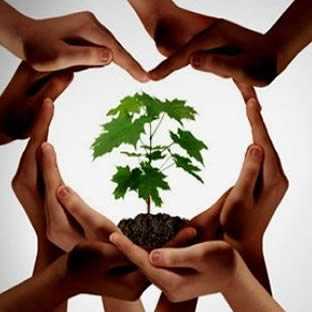Spiritual life has been metaphorically depicted through two images: the pilgrimage and the ascent to the mountain’s summit, where the soul will be united with God.[1] Under the influence of “unhealthy dualisms” that have left”a mark on certain Christian thinkers in the course of history” (LS 98), these metaphors have sometimes been misconstrued as an attempt to escape from the despised or unbearable world (fuga mundi). Dionysius the Areopagite used these words to describe the journey toward mystical vision: “Thou, O dear Timothy, by thy persistent commerce with the mystic visions, leave behind both sensible perceptions and intellectual efforts, and all objects of sense and intelligence, and all things not being and being, and be raised aloft unknowingly to the union, as far as attainable, with Him Who is above every essence and knowledge. For by the resistless and absolute ecstasy in all purity, from thyself and all, thou wilt be carried on high, to the superessential ray of the Divine darkness, when thou hast cast away all, and become free from all”[2] We need to develop a spirituality and a mystique that again opens our eyes, enabling us to discover the Invisible in everyday life and experience “the intimate…
Spirituality is fundamental on our path towards integral ecology. If we fail to cultivate our interior life, we cannot effectively care for the external world, and vice versa. Therefore, we need to “develop a spirituality” (LS 240) that helps us to perceive reality in an integral manner, recognizing it as a joyful mystery of communion and relationships. Spirituality provides the motivations we need for “a more passionate concern for the protection of our world” (LS 216; EG 261). It even enables us to experience “the intimate connection between God and all beings” (LS 234), allowing us to reach a mystical experience. We need that “interior impulse which encourages, motivates, nourishes, and gives meaning to our individual and communal activity”. Indeed, the life of the spirit must not be dissociated “from the body or from nature or from worldly realities, but lived in and with them, in communion with all that surrounds us” (LS 216). Nature must not be reduced to mere objects that we can know and, therefore, master. Its mystery is an invitation to savor, contemplate, and live. God has not revealed himself to increase our knowledge, but to establish a loving relationship with us. Indeed, all of creation…
Il titolo richiama un’urgenza nella scelta. Rinvia alla fine del tempo per prendere una decisione. Tale richiamo è un esempio della situazione in cui si trova l’umanità: dobbiamo adottare nuove attitudini se vogliamo garantire un presente più dignitoso e un futuro giusto alle generazioni future. Questa problematica è affrontata dalla Laudato Si’, che in questi giorni compie otto anni di esistenza e di interrogativi rivolti a tutta l’umanità. Viviamo in una crisi socio-ambientale, un fallimento morale che oltre a degradare e decimare le specie nella natura, opprime e toglie la vita a molti dei nostri fratelli e sorelle in modo ingiusto. Sia la natura che una gran parte dell’umanità gridano, chiedendo aiuto, mettendo in discussione il paradigma attuale e presentando la necessità di uno stile di vita nuovo che liberi, sia l’ambiente che l’umanità, in modo integrale. La teologia morale, in quanto scienza e in dialogo con le altre scienze, è chiamata a rispondere alla seguente domanda: cosa possiamo proporre come riflessione e fare in modo effettivo per risolvere questa richiesta socio-ambientale che interpella tutta la nostra generazione? Come Chiesa, come possiamo mostrare fiducia alle donne e agli uomini di oggi, e portare il Regno di Dio di fronte a…
This post asserts that the main cause of the current socio-environmental crisis is the dualistic anthropological conception that has prevailed in Western philosophy[i]. Indeed, Western culture has accentuated the separation between man and other creatures (ontic dualism), and has also divided the human being internally, making a clear separation between soul and body (ontological dualism). In this sense, the encyclical Laudato si’ affirms that “there can be no ecology without an adequate anthropology” (LS 118), and that we need to overcome those unhealthy dualisms, that “left a mark on certain Christian thinkers in the course of history” (LS 98). 1. Ontological dualism Ontological dualism distinguishes clearly between the body and the spiritual/rational dimension of man. The latter would be the most authentically human and, therefore, the body should be subordinated to it. The human being is described using “multiple oppositional pairs: body/soul, rationality/affectivity, need/freedom, nature/culture, instinct/morality, etc.” In the seventeenth century, Descartes makes a net separation between the rational soul and the body. The first would be the essence of man, who is characterized by his ability to think (res cogitans), while his body would be only a material addition that does not differ substantially from those of animals. Both…
Febbraio è stato un mese caratterizzato da eventi che scuotono la riflessione e il cuore del teologo morale. «Il Signore Dio prese l’uomo e lo pose nel giardino di Eden, perché lo coltivasse e lo custodisse» (Gen 2,15). La CEI trae spunto da questa citazione del primo libro della Bibbia per stilare il messaggio per la 44a Gionata per la Vita: Custodire ogni vita”[1]. Papa Francesco, invece, trae spunto dall’esortazione lucana: «Siate misericordiosi, come il Padre vostro è misericordioso» (Lc 6,36) per redigere il messaggio in occasione della XXX giornata dell’ammalato ed esortare a porsi accanto a chi soffre in cammino di carità[2]. Mentre «La forza della cura. Donne, economia e tratta di persone», è il tema dell’8a Giornata mondiale di preghiera e riflessione contro la tratta di persone, che si celebra l’8 febbraio, memoria liturgica di Santa Giuseppina Bakhita. Affidato alla custodia dell’uomo Questi eventi fanno riflettere sulla preziosità di ogni vita, la sua fragilità, la necessità di essere solidali per fronteggiare le difficoltà. Nel progetto originario di Dio alla custodia dell’uomo è affidato sia il suo simile ,sia il resto del creato. Nel contesto dell’emergenza pandemica che viviamo a livello planetario da due anni ormai, riflettere su questi eventi…





